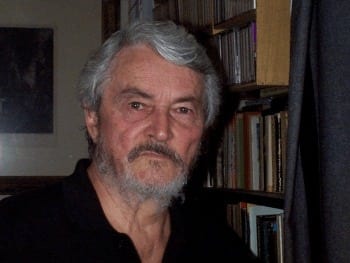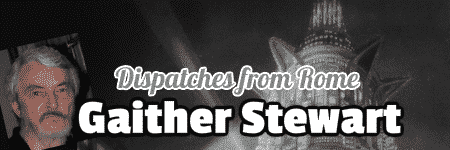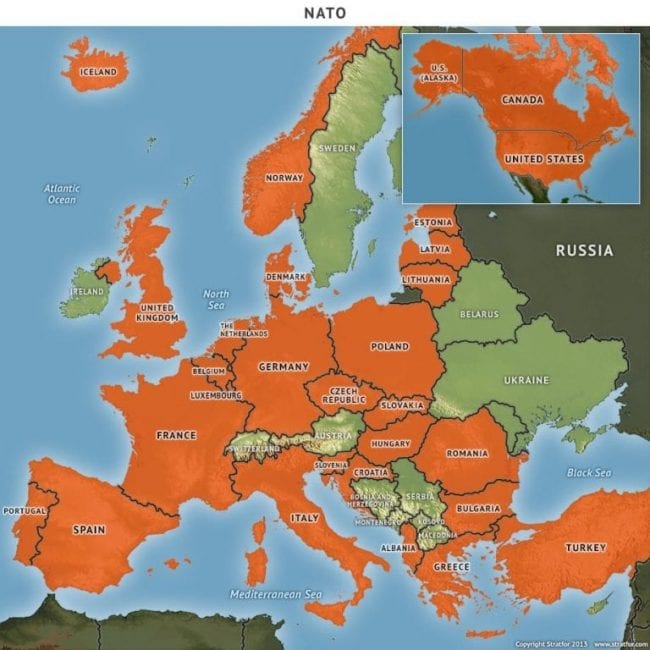Valdai discussion: Russia and NATO
On Monday, May 29, the Valdai Discussion Club hosted an expert discussion following the NATO summit in Brussels, titled “NATO and Russia: Unchanged Frontline?” Political scientists, diplomats and journalists, representing both Russia and NATO member states, discussed the state and prospects of relations between Moscow and the North Atlantic Alliance in light of the last summit’s decisions.
Alexander Grushko, Russia’s permanent representative to NATO, took part in the discussion through video conferencing from Brussels. He spoke about his impressions of the summit. According to Grushko, NATO obviously continues to experience a certain crisis. Operations outside the formal zone of responsibility of the alliance, in Afghanistan and Libya, have gone on for many years without success. Despite bold statements, NATO is ill-equipped to fight terrorism. The decision to bring the share of defense spending to 2% of GDP, adopted by the Wales summit in 2014, has met difficulties. By December of this year, the member states will have to submit plans regarding these relevant parameters. Many European members of NATO fear the possibility of the US attention switching to the Pacific region.
The crisis to its original “raison d’etre” experienced by NATO has brought renewed threats for Russia. After the end of the inter-bloc confrontation in Europe (with the collapse of the USSR in the 1990s), the alliance lost the target it was created for, and tried to find a new role for itself. According to the Russian participants at the discussion, the events of recent years show that NATO has severely drifted back towards its original aim: military deterrence of and even possible confrontation with Russia.
Evgeny Buzhinsky, Lieutenant-General (Retired), chairman of the PIR-Center, spoke about the change in perceptions of NATO in Russia. According to him, in the early 1990s there was an opinion (misguided) that it was time for Russia to join the “elite club of democracies,” in which NATO had positioned itself. This was always perceived skeptically by the Russian Ministry of Defense, but such sentiments existed in the Ministry of Foreign Affairs up to the Yugoslav events of 1998-1999, Buzhinsky noted. The understanding —rather unavoidable—has come that Russia continues to figure in NATO’s plans as a potential enemy, despite the fact that this was officially denied at all levels.
According to Alexander Grushko, Russian Permanent Representative to NATO, at the moment in the European security sector there was a turn for the worse. “For the first time in many years, security in this region will again be determined not by measures of deterrence, not by efforts to provide security without an emphasis on military means, but by keeping of a certain “balance of threats”, “Grushko said.
“We see no indication that NATO is ready to stop,” the Russian diplomat noted. “On the contrary, there remains great uncertainty about these measures that can be strengthened. The formation of four battalion groups is to be completed. The forces on the Baltic and Black Seas will be strengthened. Active development of the infrastructure is continuing: every day there are reports from Eastern Europe that the construction of certain objects begins or is being completed. Particular attention is now paid to the strengthening the southern flank: American and British forces appeared in Romania, multinational brigades are being created there. Such a picture, apparently, will determine the future structure of military security (a laughable euphemism for imperialist projection) in the region.”
According to James Sherr, Associate Fellow, Russia and Eurasia Programme, Royal Institute of International Affairs (Chatham House), who took part in the discussion through a video link from Oxford, the Brussels summit in fact confirmed the decisions of last year’s summit in Warsaw. However, it is obvious that the biggest unknown of the Brussels summit was the participation of US President Donald Trump. Trump, according to Sherr, assembled a competent national security team, but it lacks consistency. Signals that came from the administration in recent months encouraged the European allies of the United States, but during the summit Trump again aroused their concerns. This is all literally nonsense since Russia has no intention of invading Western Europe, and is only interested in defending herself from a well announced possible Western bloc attack.
Sherr noted, that NATO is a “problem” for Trump. “Despite the fact that Trump has been president for several months, he still does not seem to understand exactly what NATO is,” he said. “When he states that the alliance must solve the immigration problem, it means that he does not understand what this organization does and where the competence of the European Union begins.”
A similar assessment of Donald Trump’s foreign policy debut was given by Alexander Grushko. According to the Russian diplomat, judging by the statements of US representatives, the administration is betting on situational coalitions. A particular concern of US allies [actually vassal states in most cases] was caused by the fact, that Trump did not refer to the Fifth Article of the North Atlantic Treaty. Finally, many members expressed concern about his proposal to increase defense spending by $119 billion a year, a figure bigger than Russia’s entire military budget. This despite the ludicrously bloated US defense budget, whose visible part alone is inching toward a trillion dollars a year.
Another topic discussed was the possible creation of an European army. Buzhinsky noted that NATO remains a bloc, in which the US continues to dominate militarily. According to him, Americans play the leading role in conducting combat operations. In many European countries more than 50% of the costs go to the service support of personnel: small European armies live comfortably and do not want to fight. No European country can simultaneously take part in NATO and in a potential European army. Sherr retorted to this, saying that Europe makes “an important non-military contribution” to the alliance’s activities.
In general, the participants at the discussion stated that Russia and NATO have kept to the same positions. Perhaps the only positive element of the current state of things is that these positions are clearly and unambiguously expressed, unlike in previous years.
![]()
 Our Senior Editor based in Rome, serves—inter alia—as our European correspondent. A veteran journalist and essayist on a broad palette of topics from culture to history and politics, he is also the author of the Europe Trilogy, celebrated spy thrillers whose latest volume, Time of Exile, was recently published by Punto Press.
Our Senior Editor based in Rome, serves—inter alia—as our European correspondent. A veteran journalist and essayist on a broad palette of topics from culture to history and politics, he is also the author of the Europe Trilogy, celebrated spy thrillers whose latest volume, Time of Exile, was recently published by Punto Press.
 According to Alexander Grushko, Russian Permanent Representative to NATO, at the moment in the European security sector there was a turn for the worse. “For the first time in many years, security in this region will again be determined not by measures of deterrence, not by efforts to provide security without an emphasis on military means, but by keeping of a certain “balance of threats”, “Grushko said.
According to Alexander Grushko, Russian Permanent Representative to NATO, at the moment in the European security sector there was a turn for the worse. “For the first time in many years, security in this region will again be determined not by measures of deterrence, not by efforts to provide security without an emphasis on military means, but by keeping of a certain “balance of threats”, “Grushko said.
[premium_newsticker id=”154171″]![]()


